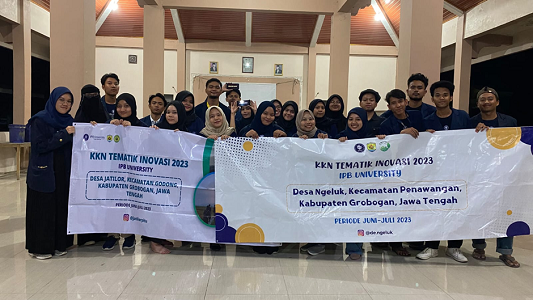Responding to Penawangan Farmers’ Complaints, KKN-T Innovation Students Invite IPB University Experts

IPB University students who are conducting community service activities in Ngeluk Village, Penawangan District, Grobogan Regency held a Smart and Healthy Agriculture activity. The activity is part of the Innovation Thematic Real Work Lecture (KKN-T) programme by presenting an IPB University expert, Bonjok Istiaji, SP, MSi from the Plant Clinic, Faculty of Agriculture.
This activity took the form of a discussion between farmers and Bonjok Istiaji, SP, MSi. Some of the problems presented were recalcitrant grass, red rice plants, damaged roots, field rats and yellow and dry viruses on eggplant plants. These problems were expressed by farmer group members from Ngeluk Village, Jatilor Village and Kemloko Village.
"To control grass, we must find the weakest point of its growth. The weakest phase lies in the sprout phase. Based on the experience of farmers in Klaten, banana fronds can be used to control the grass, which are scattered on the soil after 1-2 days of ploughing," Bonjok explained.
The next problem is related to red rice plants and damaged roots. According to Bonjo, the problem has two possible causes, firstly because the straw returned to the soil has not decomposed completely, resulting in heat in the soil and red rice plants. Microorganisms that decompose the straw will compete for nutrients with the plants, resulting in damaged roots.
"The second possibility is caused by brown planthoppers commonly called sundep and beluk. Prevention is done by giving a break in planting so that the straw decomposes well, good land management, simultaneous planting, seedling timing, the use of endophytic fungi and the collection of leafhopper eggs," explained the IPB University lecturer from the Department of Plant Protection.
"IPB University is ready to assist in providing technology such as endophytic fungi and offer further consultation on agricultural issues," he added.
Bonjok Istiaji also conveyed the most effective rat pest control using the Trap Barrier System (TBS). However, the implementation must pay attention to several things so that rats cannot break through the traps that have been installed.
Regarding the yellowing and drying of eggplant leaves, Bonjok said, "From the symptoms mentioned by the farmers, the plants were diagnosed with a virus that infects through the seeds planted and is spread by the disease vector, namely whitefly. Control is advised by not planting plants belonging to the same family and can use chitosan as an antiviral substance, so as to strengthen plant resistance."
The activity ended with the socialisation of liquid organic fertiliser (POC) from organic household waste using the piling bucket method and using cow dung. Students of KKN-T Inovasi IPB University also socialised maggot which helps the decomposition process of organic waste.
"The use of POC is very helpful in providing soil nutrients by microorganisms, so that it can nourish the soil and plants. This activity is expected to provide solutions and invite farmers to farm smartly and healthily," said Ahmad Ilhami, one of the KKN-T Innovation students.
The Smart and Healthy Agriculture activity was attended by Field Supervisors (DPL), Dr Rini Hidayati, Dr Bambang Dwi Dasanto and Dr Sri Listyowati, who also supervised the Innovation KKN-T students. Also present were H Muhammad Safii, MPd as the village head and his staff, Wakhid, representative of the Grobogan Regency Agriculture Office, Totok Suryana, Head of the Penawangan District Agricultural Extension Service (PPL). (*/Rz) (IAAS/RUM)



